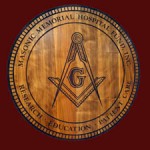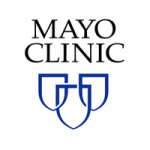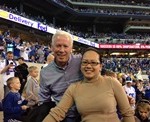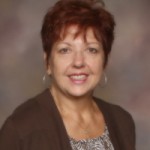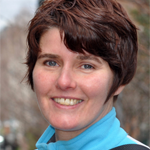 “I have never smoked a day in my life,” begins Eva Borsi, a Seattle resident who is being treated at Seattle Cancer Care Alliance for stage IV lung cancer.
“I have never smoked a day in my life,” begins Eva Borsi, a Seattle resident who is being treated at Seattle Cancer Care Alliance for stage IV lung cancer.
“I am a vegetarian. I ride my bike to work every day. An outdoor enthusiast and all around athletic person, I never imagined hearing the words ‘stage IV lung cancer,’” she says.
Eva was a healthy 46-year old mother of three daughters in March 2011 when she heard those words.
“When I experienced shortness of breath while biking a hill I had biked every day for the past six years, I tried to dismiss it, but at the urging of my friends, I went to see my primary care provider of 20 years, Karen Carlson, at the UW Medicine Roosevelt Clinic,” Eva says.
“Given our long history as patient and provider, she knew I rarely complained and took my concern very seriously,” Eva says.
Thanks to Karen’s swift action, the ball was rolling immediately. That day a chest X-ray revealed fluid around Eva’s lung, and she knew it was serious.
“Karen was worried, too,” Eva says, “and she referred me to pulmonology where the fluid was drained the next day.”
Karen’s worries were validated when pathology found cancer cells in the drained fluid.
“Dignity and pride are very important to me,” Eva says. “I needed to be emotionally ready for whatever news I was to receive. I had to prepare myself for the appointment that ultimately gave me the diagnosis of stage IV lung cancer.”
Diagnosis, Treatment, and Hope
After hearing “lung cancer,” Eva was referred to Seattle Cancer Care Alliance to see medical oncologist Laura Q. M. Chow, MD, the following day. At SCCA, Dr. Chow gave Eva her first tiny ray of hope.
“Thanks to Dr. Chow’s devotion to clinical research, I have been receiving state-of-the-art care since the beginning,” Eva says. “Three weeks after my initial diagnosis, I began chemotherapy. Due to my overall health, Dr. Chow correctly thought I could handle the heavy hitters of cisplatin, Alimta, and Avastin for five rounds. I responded well to initial chemotherapy while still working and commuting on my bike. By the end of round five, the fluid around my lungs disappeared and the tumors shrank, but I was exhausted every day. I learned firsthand what it meant to deal with chemo and all its side effects.”
After three months of initial chemo treatment, Eva was put on Alimta maintenance in hopes that the cancer cells would not grow or spread. Tolerating Alimta alone was much easier than the platinum-based therapy of cisplatin for Eva, but it was certainly not the life she envisioned for herself at age 46.
Treatment on a Clinical Study
“Many people stay on a maintenance therapy drug as long as it works, ” Eva says. “In my case after three rounds, a change needed to happen. Because Dr. Chow believes in the advances of clinical trials, I started a study drug MDX-1105 on October 14, 2011. Not knowing exactly what to expect from this preliminary drug trial, we hoped for the best.”
“Eva is on an exciting new Phase I clinical trial looking at a novel immunotherapy that re-stimulates the body’s own immune system to recognize and kill the lung cancer,” Dr. Chow says.
This trial has kept Eva stable ever since. “And stable is good in the late stages of cancer,” Eva says. “Importantly, it has given me back the quality of life I had prior to diagnosis.”
Very minor side effects allow Eva to feel like her normal spunky self. She receives her “life juice,” as Eva calls it, every two weeks at SCCA. “Physically I have been doing very well, but dealing with the emotional side of cancer is a day-to-day thing. I have been exceptionally strong as Dr. Chow says. One day at a time…”
Caring Network
Eva’s network of friends is large. She used to bring a gang of people with her on chemotherapy days to help her get through it emotionally.
“My coworkers have generously donated their leave time to me so I do not have to face more financial hardship due to treatment,” Eva says. “The outpouring of support from friends, coworkers, and even strangers has been tremendous.”
Eva has also found support from an online forum for people dealing with lung cancer in their lives. Through them, she has discovered that not all treatment centers are like SCCA. “I have received prompt, proper attention and cutting-edge care, and Dr. Chow has even taken the time to call me just to see how I am doing,” Eva says. I have never had to chase anyone or any information down. If you have to be sick, SCCA is the place to be.”
Remove the Stigma
“My greatest hopes for lung cancer, besides a cure, are to decrease the stigma surrounding it and to increase funding for lung cancer research. I wish people did not ask me if I smoked. The stigma and under funding are discouraging,” Eva says, citing the example that far fewer people are aware that November is Lung Cancer Awareness Month than are aware that October is Breast Cancer Awareness Month.
“And many more women are affected by lung cancer than breast cancer,” Eva says.
She is now involved in Breathe Deep Seattle, a local organization that raises support and funds for lung cancer research and awareness through the national organization of LUNGevity.
Living with Lung Cancer
“When you have cancer, you may change your views on life, but you still have the everyday struggles,” Eva says. “Living every day to the fullest can be difficult, and the idea of a bucket list can be impractical. My reality is that I have to take myself to work to keep my insurance to pay for my treatment. Of course I still find time to have fun, but not always in bucket list kind of ways.”
Eva finds pleasure in small things… her friends, her children, her dog, and a good workout in the gym or the occasional sunshine inside and outside.
“I hope to be able to ride my beloved pink bike a little while longer….it has been a year since the start of this new normal…I celebrated it with a weekend of skiing fun with friends,” Eva says.
